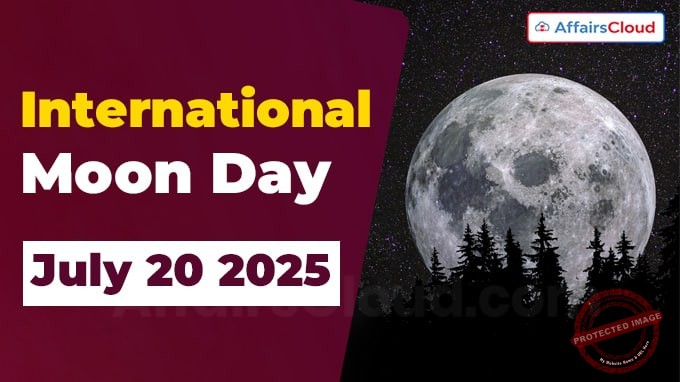 The United Nations(UN’s) International Moon Day (IMD) is observed annually on 20 July to commemorate the Apollo 11 mission (1969), when astronauts Neil Armstrong and Buzz Aldrin became the first humans to walk on the lunar surface.
The United Nations(UN’s) International Moon Day (IMD) is observed annually on 20 July to commemorate the Apollo 11 mission (1969), when astronauts Neil Armstrong and Buzz Aldrin became the first humans to walk on the lunar surface.
- The day aims to celebrate global achievement in lunar exploration, inspire youth in space science, and encourage sustainable, peaceful, and responsible use of lunar resources.
- July 20, 2025, marks the 4th IMD, and the 56th anniversary of the Apollo
Theme for 2025:
i.The theme for International Moon Day 2025, endorsed by the UN Office for Outer Space Affairs (UNOOSA)and the Moon Village Association(MVA), is “One Moon, One Vision, One Future.”
ii.The theme emphasizes the Global unity in lunar exploration, Shared ownership of the Moon as a common heritage, and Peaceful cooperation under the 1967 Outer Space Treaty.
Background:
i.During the 65th session of the UN Committee on the Peaceful Uses of Outer Space (COPUOS), the MVA formally submitted a proposal via the UNOOSA to designate 20 July as IMD.
ii.On 9 December 2021, the United Nations General Assembly (UNGA) adopted Resolution A/RES/76/76, officially proclaiming 20 July each year as International Moon Day, under “International cooperation in the Peaceful Uses of Outer Space”
iii.The inaugural International Moon Day was observed on July 20, 2022.
About Apollo 11 Mission:
i.The Apollo 11 mission, led by the National Aeronautics and Space Administration (NASA), was the first successful manned lunar landing, marking a historic achievement in space exploration
ii.The spacecraft was launched on 16th July 1969, with three astronauts on board: Neil Armstrong, Edwin “Buzz” Aldrin, and Michael Collins.
iii.On 20th July 1969, astronauts Armstrong and Aldrin successfully landed on the Moon’s surface in the Lunar Module (LM) ‘Eagle’.
iv.Neil Armstrong became the first human to set foot on the Moon, followed by Buzz Aldrin, while Michael Collins remained in orbit aboard the Command Module ‘Columbia’.
v.The mission concluded with the safe return of Apollo 11 to Earth on 24th July 1969, marking a pivotal achievement in the history of space exploration.
2025 events:
i.‘International Moon Day 2025 Main Event’ Hosted by the University of Dubai (UAE), bringing together space experts, educators, and students for a day of lunar-themed discussions and activities.
ii.The MVA’s digital platform supports satellite events worldwide, such as interactive exhibitions in Kerala, symposiums in China, and workshops in Kuwait.
Key facts:
- Soviet Union: First soft landing with Luna 9 in 1966.
- United States of America(USA): First human landing in 1969 (Apollo 11); 12 astronauts walked on the Moon.
- China: Landed Yutu in 2013 and Yutu-2 on the far side in 2019.
- Russia: Returned lunar samples in 1976.
- India: Landed Chandrayaan-3 in 2023; 4th country to do so.
India’s Lunar Achievements:
i.Chandrayaan-1 (2009): Revolutionizing Lunar Science
ii.Chandrayaan-3 (2023): Engineering Triumph at the South Pole
Note: Chandrayaan-3 demonstrated high-impact space exploration at Rs. 615 crore (USD 75 million), which is Less than half of Russia’s failed Luna-25 mission.
About the United Nations Office for Outer Space Affairs (UNOOSA):
The UNOOSA works to promote worldwide cooperation in the exploration of space, and in the utilisation of space science and technology for sustainable economic and social development. It serves as the secretariat for the UN COPUOS.
Director – Aarti Holla-Maini
Headquarters – Vienna, Austria
Established – 1958




